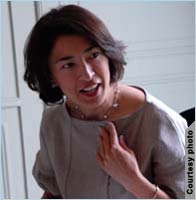After the COP-16 climate summit, there is renewed hope for a global climate treaty. Secretary of State Hillary Rodham Clinton says the Middle East peace process should focus on core issues. Chinese and U.S. defense officials talk. At a conference in Algeria, North African business is on the agenda, while talks in New Zealand center on economic cooperation. It’s called mHealth and it’s improving health care for remote populations. U.S. officials mark Human Rights Day. We’ve got a two part series on an Iranian American activist. And finally, there’s a basketball league in California with a Mecca division and a Medina division.
 Hope for Global Climate Treaty
Hope for Global Climate Treaty
(mobile version)
Because of agreements reached at the U.N.-led COP-16 climate summit in Cancún, Mexico, the world may finally be on its way toward a legally binding treaty that includes all major greenhouse gas emitters and compensates nations most vulnerable to climate change. Secretary of State Hillary Rodham Clinton calls the outcome a “significant step forward.” At right, environmental activists call attention to rising sea levels outside the conference.
Clinton: Focus on Core Issues in ME Process
(mobile version)
The United States believes it is time for the Middle East peace process to focus on the core issues of the conflict: borders and security, settlements, refugees and Jerusalem, Secretary of State Hillary Rodham Clinton says. “It is no secret that the parties have a long way to go and that they have not yet made the difficult decisions that peace requires,” Clinton, right, says.
U.S., Chinese Military Talks
(mobile version)
U.S. and Chinese defense officials recently discussed how to develop more sustained and durable military-to-military relations, Under Secretary of Defense Michele Flournoy says. “I won’t say that we agreed on every issue. Where we did differ, we had a very candid and frank and productive exchange of views,” she says.
A International Business Conference in Algiers
(mobile version)
At the U.S.-Maghreb Entrepreneurship Conference held in Algeria, North African and American business leaders discussed the potential, and the challenge, of launching businesses in countries from Libya to Mauritania. Inspired by President Obama’s June 2009 speech in Cairo and last April’s Presidential Summit on Entrepreneurship, the conference provided workshops and networking opportunities for North African entrepreneurs.
Trans-Pacific Partnership Talks
(mobile version)
Negotiations aimed at updating the Trans-Pacific Partnership Agreement made steady progress across a range of issues during just-concluded talks in New Zealand, according to the Office of the U.S. Trade Representative.
Take Two Aspirin and Text Me in the Morning
(mobile version)
Mobile phone health information, or mHealth, is improving health in populations that are difficult for doctors to reach. Even the most basic mobile phone can make medical information more accessible to doctors and patients alike.
A Day to Remember Human Rights
(mobile version)
U.S. officials from the president on down marked International Human Rights Day on December 10, which commemorates the adoption by the United Nations of the Universal Declaration of Human Rights in 1948.
An Iranian American Activist
(mobile version)
Melody Moezzi is an Iranian American who became a lawyer, then a writer, a speaker and a political volunteer. She embraced Islam, then wrote and spoke against stereotypes of Muslims in America. When she learned she had bipolar disorder, she began writing for fellow patients and works to clear up misconceptions about them. Read our two part series on Moezzi and her activism.
 A Muslim American Basketball League
A Muslim American Basketball League
(mobile version)
Orange County’s Muslim Basketball League, started in 2004 with eight teams, now includes 33 teams, split into the Mecca division and the Medina division. The league grew out of a desire for young Muslim men to socialize while doing something they love. At left, the Mecca division team Intifada after winning a championship.







